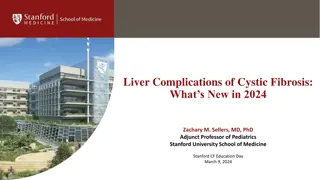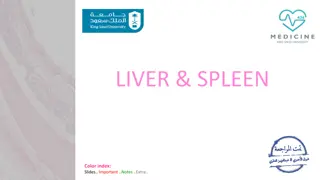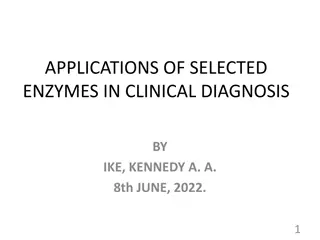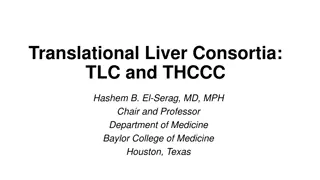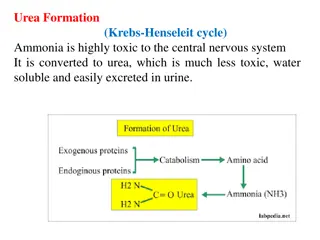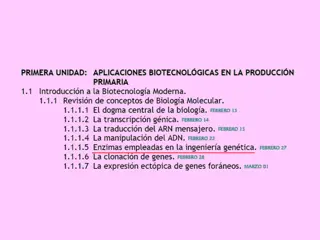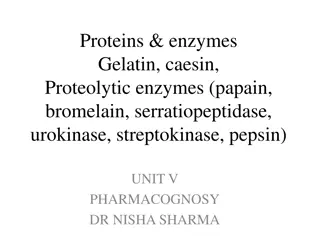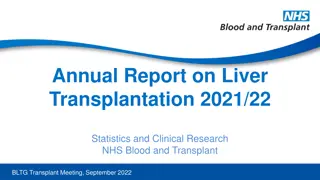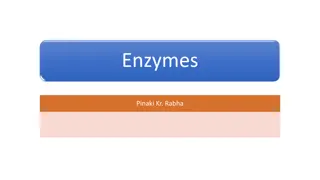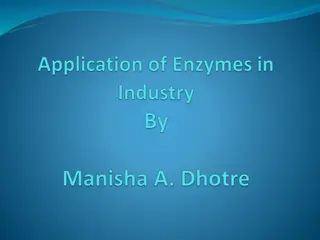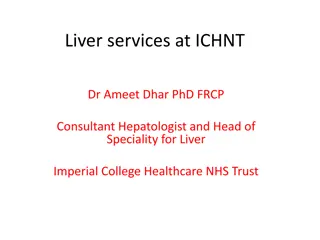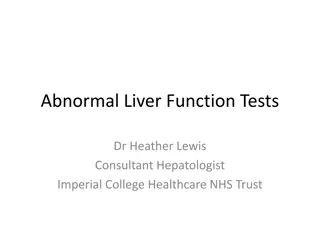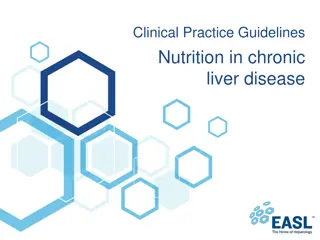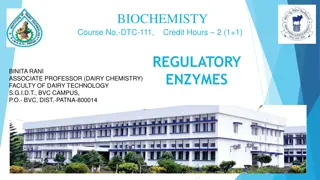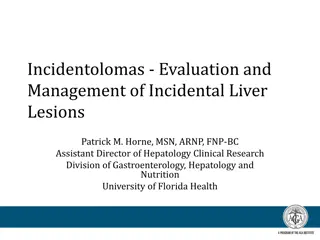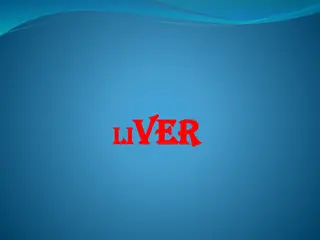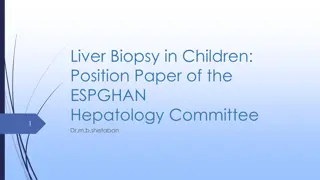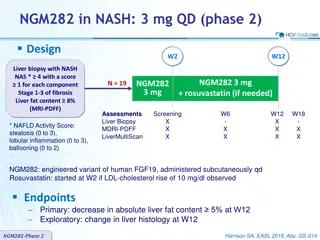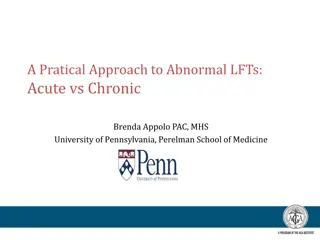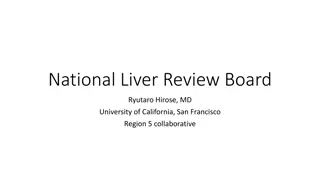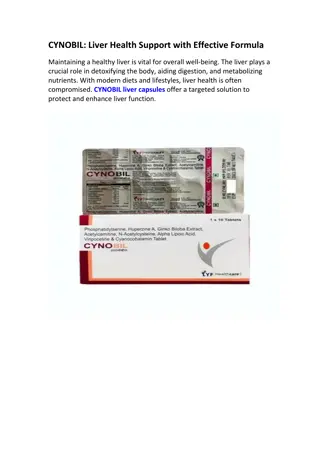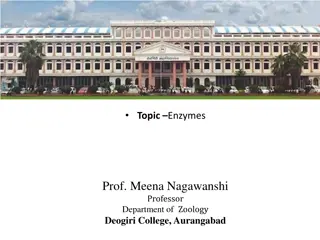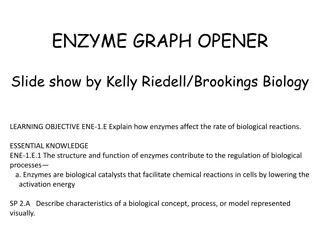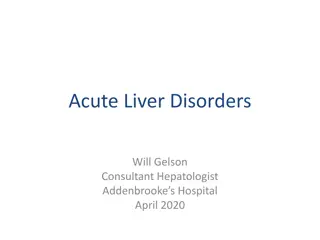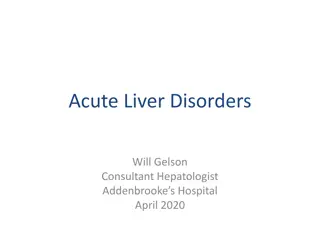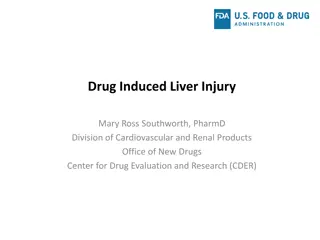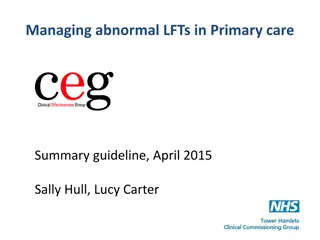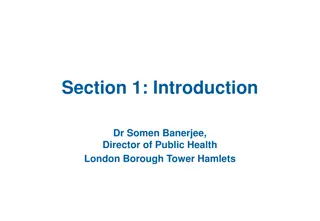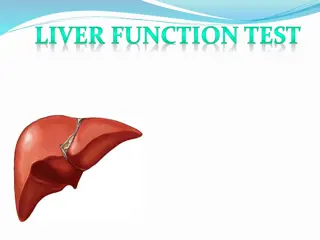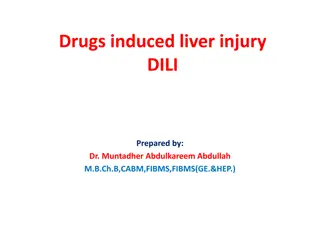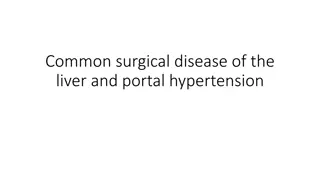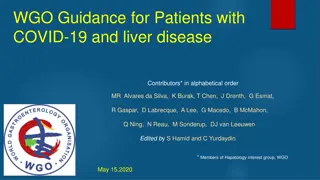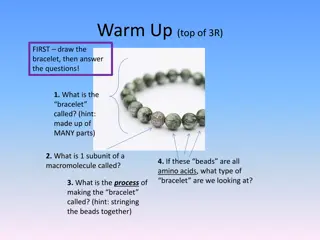Understanding Liver Function Tests in Cholestatic Injury
Cholestatic liver disease affects Alkaline Phosphatase (ALP) and bilirubin levels, indicating bile duct damage. GGT and 5'-Nucleotidase help differentiate hepatobiliary vs. bone origin of ALP elevation. ALP is produced by bile duct epithelium and can be normal in acute biliary obstruction. GGT and N
1 views • 33 slides
Understanding Steatotic Liver Disease: Importance, Epidemiology, and Pathology
Steatotic liver disease, including metabolic dysfunction associated steatohepatitis (MASLD) and metabolic associated alcoholic liver disease (MALD), is a common cause of liver test abnormalities in the United States. Risk factors such as obesity and metabolic syndrome can lead to advanced fibrosis a
1 views • 44 slides
Liver Transplant in India for treatment
Liver is the largest gland in our body, and an important metabolic organ which carries out many essential biological functions. The liver is a wedge-shaped, reddish-brown in color with two lobes of different size and shape. The approximate weight of a human liver is 1.5 kilograms. It is in the upper
5 views • 2 slides
Understanding Liver Complications in Cystic Fibrosis: Latest Insights for 2024
Liver complications in cystic fibrosis (CF) have gained importance due to CFTR modulators impacting liver health. This presentation by Dr. Zachary M. Sellers delves into new definitions for CF liver disease, CFF recommendations for screening, management, and treatment of hepatobiliary issues in CF.
0 views • 17 slides
Enzymes are Proteins that act as Biological Catalyst
Enzymes, as proteins acting as biological catalysts, accelerate chemical reactions without being consumed. They have active sites where substrates bind, and their specificity can be lock-and-key or induced fit. Enzymes are named based on their function or the substrates they interact with. Enzyme sp
5 views • 20 slides
Best Liver transplant hospitals in India
Best Liver Transplant Hospitals in India\nThe liver is a vital organ that performs important functions in the human body, including detoxification, metabolism, and the production of essential proteins. However, certain conditions such as liver failure, cirrhosis, or liver cancer may necessitate a li
0 views • 2 slides
Histological Structure of Liver and Spleen: Key Features and Functions
In this informative content, the histological structures of the liver and spleen are explored in detail. Key components such as hepatocytes, sinusoids, bile canaliculi, and the spaces of Disse in the liver, and the white pulp and red pulp in the spleen are highlighted. The classic liver lobule, cent
1 views • 10 slides
Applications of Enzymes in Clinical Diagnosis: A Comprehensive Overview
Enzymes play a crucial role in cellular metabolism and are essential for various biochemical reactions in living organisms. This detailed study explores the sources, classification, properties, and factors affecting enzymes, emphasizing their applications in diagnostic and analytical processes. By h
1 views • 35 slides
Translational Liver Cancer Research Initiatives
Translational Liver Consortia (TLC) and the Translational Hepatocellular Carcinoma Consortium (THCCC) led by Dr. Hashem B. El-Serag are focused on advancing research for early detection of liver cancer. The main objectives include patient stratification for liver cancer risk, surveillance in cirrhos
0 views • 25 slides
Urea Biosynthesis and the Krebs-Henseleit Cycle in the Liver
Urea is synthesized in the liver through a series of enzymatic steps known as the urea cycle or Krebs-Henseleit cycle. This process involves converting toxic ammonia into urea, a less toxic and water-soluble compound that can be easily excreted in urine. The liver plays a crucial role in urea biosyn
1 views • 20 slides
Overview of Key Enzymes in Modern Biotechnology
This content provides insights into important enzymes used in modern biotechnology, focusing on DNA ligases and polymerases. It delves into the structures, mechanisms, and characteristics of these enzymes, such as Taq polymerase and bacteriophage T4 DNA ligase. Through detailed descriptions and imag
0 views • 15 slides
Understanding Proteins and Enzymes: Classification, Sources, and Applications
Proteins and enzymes play crucial roles in various biological processes. Enzymes act as catalysts, with different types classified based on their functions. Papain enzyme, derived from Carica papaya, exemplifies proteolytic enzymes used in the food and beverage industry as a meat tenderizer and in c
2 views • 15 slides
Liver Transplantation Report 2021/22 Statistics & Research Findings
The Annual Report on Liver Transplantation 2021/22 presents detailed statistics and clinical research findings from the NHS Blood and Transplant BLTG Transplant Meeting in September 2022. The report covers an overview, transplant list, donor and organ supply, transplant activity, and outcomes. It hi
0 views • 45 slides
Understanding Enzymes: Nature, Classification, and Mechanism of Action
Enzymes are biocatalysts synthesized by living cells. They are protein in nature and specific in their action. This article delves into the definition of enzymes, classification based on enzymatic action, enzyme class reactions, structure, and mechanism of enzyme action, highlighting how enzymes pla
1 views • 19 slides
Enzymes in Industrial Processes: Applications and Benefits" (58 characters)
Enzymes play a crucial role in various industrial processes, such as denim bleaching, food production, brewing, and more. They are used for enhancing efficiency, achieving desirable outcomes, and creating innovative products in industries like food, dairy, starch, brewing, and paper. Enzymes like am
0 views • 16 slides
Liver Services at Imperial College Healthcare NHS Trust
The liver services at Imperial College Healthcare NHS Trust, led by Dr. Ameet Dhar, provide a comprehensive range of services for patients with liver conditions. With over 2000 new patients seen annually, services include inpatient care, specialist clinics, outreach programs, and referral pathways.
0 views • 14 slides
Understanding Abnormal Liver Function Tests: Insights from Dr. Heather Lewis, Consultant Hepatologist
Abnormal liver function tests can be a perplexing issue with various underlying causes. Dr. Heather Lewis, a renowned Consultant Hepatologist at Imperial College Healthcare NHS Trust, sheds light on the significance of liver function tests, liver enzymes, and blood markers in diagnosing liver condit
0 views • 21 slides
Clinical Practice Guidelines: Nutrition in Chronic Liver Disease Overview
These slides provide a comprehensive overview of the EASL clinical practice guidelines on nutrition in chronic liver disease. The guidelines were first presented at the International Liver Congress 2018 and will soon be published in the Journal of Hepatology. The content covers methods of grading ev
6 views • 37 slides
Understanding Regulatory Enzymes in Biochemical Pathways
Regulatory enzymes play a crucial role in controlling the activity of biochemical pathways by responding to the presence of specific molecules. They regulate the pathway's activity, ensuring that products are produced in the required amounts at different times. This article delves into the significa
5 views • 22 slides
Evaluation and Management of Incidental Liver Lesions
Understanding the natural history, evaluation, and management of benign liver lesions is crucial for diagnosing incidental liver findings. Common benign liver lesions include hepatic hemangioma, focal nodular hyperplasia, hepatic adenoma, and hepatic cyst. Differential diagnosis plays a key role in
0 views • 37 slides
Insights into Liver Anatomy, Function, and Imaging Studies
Delve into a comprehensive overview of the liver's anatomy, including ligaments, blood supply, and structure in the hilum. Explore the vital functions performed by the liver, such as maintaining body temperature, synthesizing clotting factors, and drug metabolism. Discover liver function tests and t
3 views • 22 slides
Evolution of Liver Biopsy in Children: ESPGHAN Position Paper
Liver biopsy plays a crucial role in diagnosing, staging, and prognostic evaluation of liver diseases in children. Indications for liver biopsy include diagnostic, prognostic, and monitoring purposes. Specific scenarios like neonatal cholestasis and progressive familial intrahepatic cholestasis requ
2 views • 47 slides
Understanding Liver Detoxification and Harmony in Traditional Chinese Medicine
The liver plays a crucial role in detoxification and maintaining harmony in the body according to Traditional Chinese Medicine (TCM). Issues like liver disharmony can lead to various symptoms and health conditions. TCM emphasizes the importance of supporting liver function for overall well-being by
0 views • 21 slides
NGM282 in NASH: Phase 2 Study on Liver Fat Reduction and Histology Changes
A phase 2 study on NGM282 in NASH patients showed a significant decrease in liver fat content, meeting the primary endpoint. Exploratory findings also indicated potential improvements in liver histology. The treatment involved NGM282 at 3 mg QD, with additional rosuvastatin if needed. Promising resu
0 views • 11 slides
Understanding Abnormal Liver Function Tests: Acute vs. Chronic Approach
Comprehensive discussion on assessing patients with abnormal liver test results, focusing on distinguishing between acute and chronic liver conditions. Covers diagnostic workup, patient cases, and differential diagnosis, emphasizing the importance of patient history, physical examination, and key di
0 views • 16 slides
Pharmacotherapy for Non-Alcoholic Fatty Liver Disease: An Updated Review by Anita Eftekharzadeh
This comprehensive review discusses the pharmacotherapy options for Non-Alcoholic Fatty Liver Disease (NAFLD), covering topics such as sub-classification of NAFLD, proposed risk stratification, non-invasive measures for assessing liver fibrosis, and the NAFLD Activity Score (NAS). Anita Eftekharzade
0 views • 44 slides
National Liver Review Board: Solving Inconsistencies in Transplant Approvals
The National Liver Review Board, led by Dr. Ryutaro Hirose at the University of California, San Francisco, aims to address inconsistencies in liver transplant applications and approvals across UNOS regions. The board focuses on eliminating disparities in acceptance rates, refining approval practices
0 views • 18 slides
CYNOBIL Liver Capsules – Boost Liver Health & Detox | LYF Healthcare
CYNOBIL liver capsules offer comprehensive liver support with a natural blend of silymarin, artichoke extract, and NAC. Improve liver function, detox, and digestion with CYNOBIL by LYF Healthcare.\n
0 views • 3 slides
Understanding Enzymes and Restriction Enzymes in Molecular Biology
Enzymes are essential proteins that catalyze biochemical reactions. Bacteria have evolved enzymes like restriction endonucleases to protect against foreign DNA, such as viral DNA. The discovery of restriction enzymes in E. coli led to the Nobel Prize in Medicine in 1978. These enzymes cut DNA at spe
0 views • 24 slides
Enzymes in Biological Reactions: Understanding Activation Energy
Enzymes, as biological catalysts, play a crucial role in regulating biological processes by lowering the activation energy required for chemical reactions in cells. The addition of enzymes changes the overall energy dynamics of reactions, impacting the rate at which products are formed. This interac
0 views • 7 slides
Principles and Management of Acute Liver Disorders by Consultant Hepatologist
This presentation discusses the principles, causes, presentations, management, and prognosis of acute liver disorders, with a focus on insult to the normal liver leading to liver injury, inflammation, and necrosis. It covers causes such as drugs, viruses, ischemia, autoimmune conditions, Budd-Chiari
0 views • 16 slides
Understanding Acute Liver Disorders: Causes, Presentations, and Management
Acute liver disorders can have various causes such as drugs, viruses, ischemia, autoimmune conditions, and more. The presentations of acute liver disease can include abnormal liver tests, jaundice, liver impairment, and even liver failure. Management involves removing and treating the underlying cau
0 views • 16 slides
Understanding Drug-Induced Liver Injury (DILI) and Its Implications
Drug-Induced Liver Injury (DILI) is a serious concern that can lead to fatal liver damage, affecting drug development and potentially causing market withdrawal. This article explores the importance of DILI awareness, the critical functions of the liver, common causes of liver failure, and the backgr
0 views • 24 slides
Managing Abnormal Liver Function Tests in Primary Care: Summary Guideline
Guideline drafted by Dr. Sally Hull and Dr. Lucy Carter focuses on identifying patients at risk of chronic liver disease, increasing testing for treatable liver conditions, and auditing prevalence of major liver diseases. The importance of diagnosing Non-Alcoholic Fatty Liver Disease (NAFLD) and str
0 views • 23 slides
Liver Disease Burden in Tower Hamlets
Dr. Somen Banerjee, Director of Public Health in London Borough Tower Hamlets, highlights the concerning liver disease mortality rates in the area, with high incidence of cirrhosis, cancer, and hepatitis B and C. The data reveals a significant burden of liver diseases such as Non-Alcoholic Fatty Liv
0 views • 18 slides
Understanding Liver Function Tests and Their Significance
The liver carries out essential metabolic, excretory, protective, synthetic, and storage functions in the body. Liver function tests play a crucial role in screening for liver dysfunction, recognizing patterns of liver disease, assessing patient prognosis, monitoring disease progression, and evaluat
0 views • 48 slides
Understanding Drug-Induced Liver Injury (DILI)
Drug-induced liver injury (DILI) can present as cholestasis, hepatocyte necrosis, steatosis, vascular damage, and hepatic fibrosis. Various drugs like antibiotics, NSAIDs, recreational drugs, and herbal remedies can cause liver damage. Recognizing DILI is crucial in patients with liver dysfunction o
0 views • 9 slides
Overview of Common Surgical Liver Diseases and Portal Hypertension
The liver plays a crucial role in metabolism, coagulation, and immune function. Surgical diseases of the liver, such as liver cysts and cavernous haemangiomas, can impact its normal functions. Imaging modalities like ultrasound (US), CT scans, and MRI are essential for diagnosing and staging liver t
0 views • 46 slides
Guidance for Patients with COVID-19 and Liver Disease Overview
This guidance provides detailed information on COVID-19 and liver disease, covering topics such as COVID-19 overview, liver test abnormalities, co-morbidities, viral hepatitis B and C, metabolic dysfunction, autoimmune hepatitis, clinical care aspects, complications management, screening for HCC, an
0 views • 14 slides
Exploring Enzymes: The Key Players in Chemical Reactions
Enzymes play a crucial role in speeding up chemical reactions in living organisms. This warm-up session introduces the concept of enzymes using a bracelet analogy, highlighting their significance in digestion and other biological processes. The interactive content covers enzyme structure, function,
0 views • 12 slides



